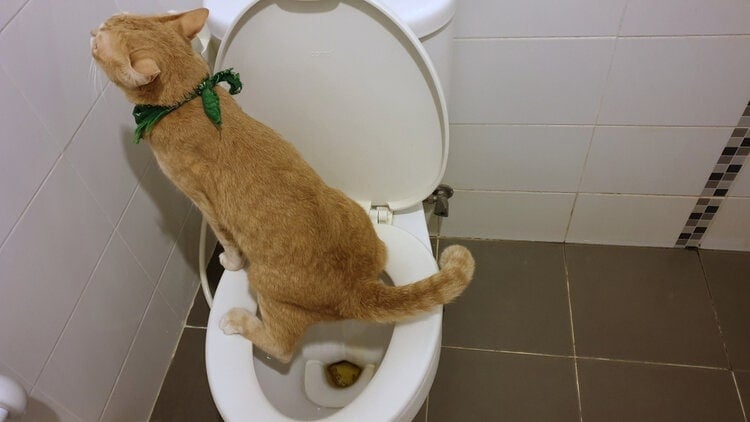Reasons You Should Never Flush Cat Poop Down Your Toilet - Critical Information
Reasons You Should Never Flush Cat Poop Down Your Toilet - Critical Information
Blog Article
They are making several great points relating to How to Dispose of Cat Poop and Litter Without Plastic Bags as a whole in the article directly below.

Intro
As cat owners, it's vital to bear in mind how we take care of our feline close friends' waste. While it may appear practical to purge feline poop down the bathroom, this technique can have destructive repercussions for both the environment and human health.
Alternatives to Flushing
The good news is, there are much safer and more liable ways to dispose of feline poop. Consider the complying with alternatives:
1. Scoop and Dispose in Trash
The most usual method of disposing of pet cat poop is to scoop it into a naturally degradable bag and toss it in the garbage. Be sure to utilize a committed clutter scoop and get rid of the waste immediately.
2. Usage Biodegradable Litter
Go with biodegradable feline trash made from products such as corn or wheat. These clutters are eco-friendly and can be securely taken care of in the trash.
3. Bury in the Yard
If you have a backyard, think about hiding pet cat waste in a designated area away from vegetable yards and water resources. Make certain to dig deep adequate to stop contamination of groundwater.
4. Set Up a Pet Waste Disposal System
Purchase an animal waste disposal system specifically made for feline waste. These systems utilize enzymes to break down the waste, decreasing odor and ecological effect.
Health Risks
Along with ecological issues, purging feline waste can likewise pose health dangers to people. Feline feces might contain Toxoplasma gondii, a parasite that can trigger toxoplasmosis-- a possibly extreme illness, particularly for expecting ladies and individuals with weakened body immune systems.
Ecological Impact
Flushing feline poop introduces dangerous virus and bloodsuckers into the water system, presenting a considerable danger to aquatic communities. These contaminants can adversely affect marine life and concession water high quality.
Conclusion
Liable family pet ownership expands beyond providing food and sanctuary-- it also entails proper waste monitoring. By refraining from purging cat poop down the commode and choosing alternative disposal techniques, we can decrease our ecological impact and protect human health and wellness.
Why You Should Never Flush Cat Poop Down the Toilet
A rose by any other name might smell as sweet, but not all poop is created equal. Toilets, and our sewage systems, are designed for human excrement, not animal waste. It might seem like it couldn’t hurt to toss cat feces into the loo, but it’s not a good idea to flush cat poop in the toilet.
First and foremost, assuming your cat uses a litter box, any waste is going to have litter on it. And even the smallest amount of litter can wreak havoc on plumbing.
Over time, small amounts build up, filling up your septic system. Most litter sold today is clumping; it is made from a type of clay that hardens when it gets wet. Ever tried to scrape old clumps from the bottom of a litter box? You know just how cement-hard it can get!
Now imagine just a small clump of that stuck in your pipes. A simple de-clogger like Drano isn’t going to cut it. And that means it’s going to cost you big time to fix it.
Parasitic Contamination
Believe it or not, your healthy kitty may be harboring a nasty parasite. Only cats excrete Toxoplasma in their feces. Yet it rarely causes serious health issues in the cats that are infected. Most people will be fine too if infected. Only pregnant women and people with compromised immune systems are at risk. (If you’ve ever heard how women who are expecting are excused from litter cleaning duty, Toxoplasma is why.)
But other animals may have a problem if infected with the parasite. And human water treatment systems aren’t designed to handle it. As a result, the systems don’t remove the parasite before discharging wastewater into local waterways. Fish, shellfish, and other marine life — otters in particular — are susceptible to toxoplasma. If exposed, most will end up with brain damage and many will die.
Depending on the species of fish, they may end up on someone’s fish hook and, ultimately on someone’s dinner plate. If that someone has a chronic illness, they’re at risk.
Skip the Toilet Training
We know there are folks out there who like to toilet train their cats. And we give them props, it takes a lot of work. But thanks to the toxoplasma, it’s not a good idea.

We were shown that article about Don’t flush cat feces down the toilet from a good friend on a different web blog. Don't hesitate to take the opportunity to promote this write-up if you liked it. Thank you so much for your time invested reading it.
Call Today Report this page